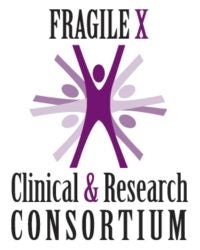New York State Institute for Basic Research (IBR) and the Fragile X Clinical and Research Consortium (FXCRC) Continue To Make Great Strides with the CDC supported Fragile X Online Registry With Accessible Research Database (FORWARD)
 The IBR and the National Fragile X Foundation (NFXF) are pleased to announce better than expected progress in the collection of critical public health data to better define the implications of Fragile X mutations across the lifespan. A recent review disclosed that the number of participants in FORWARD with complete baseline data is better than projected. Research participants are recruited through one of the 25 FXCRC clinics that participate in FORWARD.
The IBR and the National Fragile X Foundation (NFXF) are pleased to announce better than expected progress in the collection of critical public health data to better define the implications of Fragile X mutations across the lifespan. A recent review disclosed that the number of participants in FORWARD with complete baseline data is better than projected. Research participants are recruited through one of the 25 FXCRC clinics that participate in FORWARD.
“This is a direct reflection of the success of the FXCRC” said Ted Brown, MD, PhD, Director of the New York State Institute for Basic Research in Developmental Disabilities (IBR) and the Principal Investigator of the Cooperative Agreement with the Centers for Disease Control and Prevention (CDC). “We were able to make accommodations to assure that clinics will continue to expand the database and continue to be compensated for entering this data …as the FORWARD Database continues to grow, so too will its contribution to the state of the science of Fragile X,” said Brown.
The NFXF is a subcontractor on the Cooperative Agreement and works closely with IBR and the FORWARD steering committee which includes Drs. Brown, Elizabeth Berry-Kravis, Stephanie Sherman, Howard Andrews, and Walter Kaufman. The NFXF administers compensation to the clinics for data entry. “We acknowledge the importance of the data being collected by the clinics and are most pleased that we have surpassed initial projections,” said Jeffrey Cohen the foundation’s Interim Executive Director. “The FXCRC, led by Dr. Brown, has assembled a consortium of 27 specialty clinics that are making state of the science care available to families across the country and collecting valuable public health data on Fragile X,” added Cohen.
The FORWARD project consists of a Registry and Database. The Registry collects basic demographic information on families to describe the population of families attending clinics and to assist families and researchers connecting with one another for research projects. The Database collects longitudinal data (from multiple visits over time) on children and adults with Fragile X syndrome (FXS) to increase scientific and clinical understanding of FXS through the lifespan – from birth to adulthood.
To date, almost 2,200 people have enrolled in the Registry, which includes individuals with Fragile X syndrome (FXS), Fragile X-associated tremor/ataxia syndrome, Fragile X-associated primary ovarian insufficiency as well as unaffected family members.
The Database is nearing its goal of enrolling 500 children and adults with FXS with information on medication use, clinical services, early intervention and educational services, language and cognitive function, family support, and social participation. The longitudinal aspect of this effort means that the FXCRC clinics need to continue collecting information on people in the Database beyond the first enrollment and after their first visit. Funding from CDC supports the development of FORWARD. The specialty clinics that participate in FORWARD, through the FXCRC, make it possible to follow people forward in time, on an annual basis, to get a better picture of the need for medications, services, and care for people living with FXS.
“For our part the NFXF would like to thank our champions in Congress whose support over the past ten years has made the FXCRC possible. Senators Stabenow and Isakson and Representatives Engel and Harper understand the importance of the FORWARD project and have consistently supported the appropriations necessary to continue the project,” said Cohen.
The NFXF is proud to be a part of this important project, congratulates the member clinics for their fine work in support of patients and in the collection of valuable public health data and looks forward to working on the FORWARD project for many years to come.

